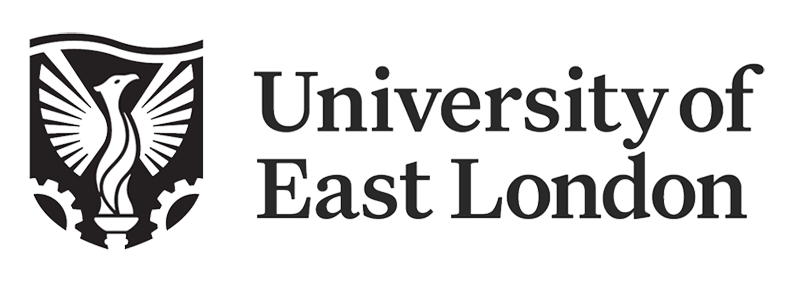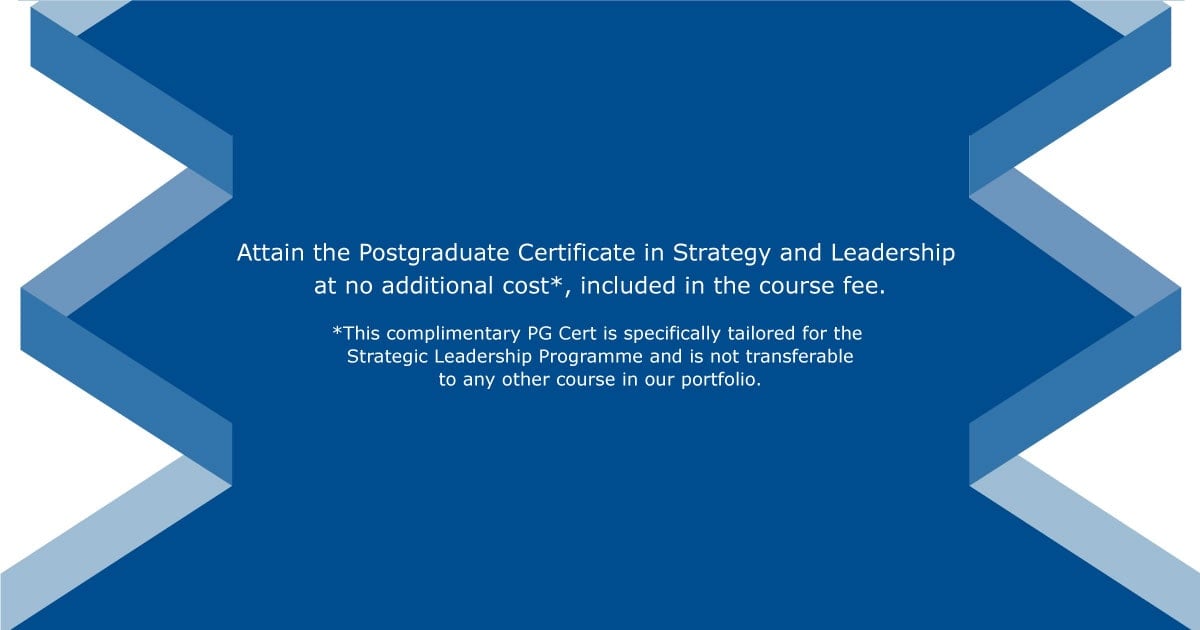Strategic Leadership Programme
The Strategic Leadership Programme provides professionals with the framework to enhance and maximise their strategic leadership performance and become more resilient and emotionally intelligent in their approach.
This programme has been designed to provide the skills, tools and knowledge that you require to operate effectively in constantly changing and challenging environments. Additionally, the programme gives learners the opportunity to take their studies to the next level by offering an associated qualification - the Postgraduate Certificate in Strategy and Leadership, which is validated by the University of East London.
Participants will get the chance to develop a detailed understanding of leadership styles and their impact on others. You will develop skills to manage resistance to change and lead effectively in challenging circumstances.
The programme will help attendees successfully lead and manage their organisations and be able to put effective strategy into action.
Course Summary
Postgraduate Certificate in Strategy and Leadership - Included
Duration:
5 Day
Delivery Method and Price:
Virtual Classroom:
£2,300
About Us
About the Programme
This programme has been designed for managers, directors and senior stakeholders with a minimum of three years’ senior management experience.
This course is for you if you want to:
- Define the factors that differentiate strategic leadership from operational leadership
- Define your own professional values, beliefs and drivers
- Critically review your organisational culture
- Use intelligence-based models to evaluate strategic change
*Please note that some of the materials and objectives may be subject to change depending on discussions, activities and needs of the cohort upon reflection of delegate responses to the pre-programme questionnaires.*
On completion of this programme, delegates will:
- Develop a clear understanding of your psychological working preferences using the 5 Factor Model.
- Define your own professional values, beliefs and drivers as a strategic leader.
- Use the ‘Observer Self’ concept to review and improve how you lead projects and programmes and interact with others.
- Define the factors that differentiate Strategic Leadership from Operational Leadership and how to make the transition.
- Review your internal (people) strategy. Apply models of situational leadership, coaching, mentoring and facilitation to enhance the capabilities of your team and develop a succession plan.
- Critically review your organisational culture, utilising cultural analysis and examine how this impacts your strategy.
- Review your external (commercial) strategy. Clarify your Vision, examine how events in the macro-environment are affecting your organisation and how you are responding to this.
- Analytical strategy. Utilise analytical tools and models to analyse relevant strategic problems and paradoxes and develop strategies to engage with them
- Creative strategy. Engage with creative approaches to reframe the organisational reality, and identify original, innovative solutions that will create new avenues for the organisation and your career.
- Evaluate strategic change. Use intelligence-based models to assess the impact of internal and externally driven change.
- Manage strategic change. Assess the practical and psychological effect of change, and utilise Agile principles to iterate and develop your strategy in response.
- Develop peer reviewed, real world, evidence based strategy, drawing on the most relevant tools and theory for your organisation’s culture and your leadership approach
Session 1
Personality and Individual Drivers in Leadership
Key themes include:
- Personality in leadership
- Dominance, influence, steadiness, and compliance (DISC) profiling
- Defining leadership
- Neurological levels
- Authenticity
- Leadership values
Session 2
People Strategy
Key themes include:
- Analyse your organisational climate
- Organisational alignment and conflict
- Transactional analysis
- Emotional intelligence
- Situational leadership
Session 3
Analytical and Creative Strategy
Key themes include:
- Individual and team influence on strategy
- Dysfunctions of a team
- High performing teams
- Coaching and mentoring
Session 4
Implementing and Managing Strategic Change
Key themes include:
- Vision, mission and values
- Strategic planning tools
- Culture and strategy
- Problems
Session 5
Evaluation, Presenting your Strategy, and Peer Review
Key themes include:
- The challenge of change
- Change management
- Evaluation
- Innovation and ‘agile’
- Action planning
Attain the Postgraduate Certificate in Strategy and Leadership at no additional cost*, included in the course fee.
The Postgraduate Certificate in Strategy and Leadership
Following completion of the Strategic Leadership Programme, learners can opt to continue their studies with a Postgraduate Certificate in Strategy and Leadership, validated by the University of East London. This is a level 7 postgraduate qualification which sits between an undergraduate degree and a masters.
- Highly flexible programme to work around individuals, with three entry points throughout the year (September, January and May).
- Qualification can be achieved within 9 months of starting the PG Cert journey.
- Modules include: Effective Strategy in Action and Leading and Managing an Organisation.
- Dedicated one-to-one support from our team of highly experienced acedemic supervisors, plus additional support from the Quality Assurance Team here at In Professional Development.
- Focus on work-based learning. Assessments can all be applied to the business situation/workplace, giving both the student and the wider organisation a chance to learn and adapt business practice.
- Achieving a PG Cert allows individuals to list the qualification as part of their credentials.
- Invitation to attend the University of East London graduation ceremony.
Click here to find out more information about the PG Cert in Strategy and Leadership.
*This complimentary PG Cert is specifically tailored for the Strategic Leadership Programme and is not transferable to any other course in our portfolio.

William McKee
Tutor
Starting out as a civil engineer responsible for large infrastructure projects, William became fascinated with the people side of business. Now a qualified business psychologist, and executive coach, he aims to bring a refreshingly practical approach to culture, people and performance. Over the last 10 years, he has worked with leaders and managers in organisations like British Airways, the Met Office, Bombardier, the NHS and multiple local authorities. He also spent time supporting SMEs and start-ups as well as working in the Middle East with one of the world’s largest food producers. As a result, he can relate to a wide range of people and organisational contexts.
Credentials:
- Member of the International Coaching Federation (ICF) and holds the Associate Certified Coach (ACC) credential
- Lecturer with Henley Business School, teaching on its Professional Certificate in Executive Coaching (PCEC) programme
- Holds a Team Coaching Certificate from the Academy of Executive Coaching (AoEC)
- Holds a foundation certificate in Nancy Kline’s Time to Think coaching method
- Recently interviewed for the book Coaching with Research in Mind on utilising psychometrics with coaching, as he aims to strike a balance between practical ‘rules of thumb’ and the latest evidence-based research.

David Smith-Collins
Tutor
David is an inspirational Executive Coach and Leadership Mentor with two decades of experience in people development. He is a Law Graduate (LLB), a Chartered Fellow of the CIPD and he holds an MA in Coaching and Mentoring, a post graduate diploma in Criminology and an MA in Organisational Management and Economics.
David has worked with colleagues at all levels in organisations in sectors including petrochemicals, telecoms, IT, banking and finance, construction, aviation, higher education, ministry, transportation, security, military and customer service. He has a motivational and supportive coaching style.
With more than 30 years in policing, his career has involved strategic planning, performance delivery, security management, risk management and disaster recovery. He is an accomplished strategist. David has extensive experience of operating at a strategic level in public, private and third sector organisations, both in the UK and internationally, bringing a broad spectrum of knowledge, awareness and expertise across a wide range of subjects and disciplines.

James Willerton
Tutor
With more than 10 years of business consulting and professional service experience, James has developed a well-rounded and practical perspective on strategic development and human capital development at all levels and cross-industries both nationally and internationally. With a focus on innovation in strategy development, James is a certified 'exceptional trainer’. He has a diverse background in business management, innovation, strategy development, organisational development, recruitment and operations.
During his role in recruitment, James applied advanced psychometric techniques and personally assessed over 1,000 candidates for client’s businesses, as well as his own. Combined with coaching, this has given him an advanced experience of dealing with the human psyche and obtaining optimal results for human capital and organisational development.
James has a very approachable manner, with valuable real-world experience as an employer and a senior consultant to a wide-range of industries and organisations.

Dr Victoria Smith-Collins
Executive Coach
Dr Victoria Smith-Collins, Managing Director of Smith-Collins International, is one of our most experienced trainer-facilitators and coaches.
Victoria has over 20 years of academic and corporate experience that spans international markets. She has trained/supervised academic programmes up to MBA level (including delivering lectures, tutorials and dissertation supervision). Victoria has also worked extensively with the Chartered Management Institute, delivering programmes, examining and verifying assessment work.
Victoria specialises in leadership and management development, with a focus on strategic leadership, consumer psychology (the subject of her Ph.D), organisational development, and change management. She has worked internationally for 13 years, where she has worked for an international training institute and has headed the Learning and Development function at one of the Middle East’s largest regional banks.
Whilst at the training institute, Victoria grew and developed a number of professional UK based programmes (including those from CMI and CIM). Before moving to the bank, Victoria took on a senior business development role which primarily involved consulting with key clients (cross-sectors) and partnering with them to understand their development needs and tailor programmes to fulfil those needs.

James Fowler
Tutor
Dr James Fowler is a lecturer in strategy and the Deputy MBA Director at Essex University’s Business School. He was formerly a regular Officer in the Armed Forces where his appointments included running the language wing of the Defence College of Intelligence and Security and advising the Royal Engineers’ training and development team. In his academic career James has published a series of books and journal articles in the field of business and management history. Alongside his academic work he is also frequently in contact with business via consultancy and executive education. In those capacities he has advised and worked with Brusov University, the TALE - Haven Gateway Partnership, Transport for London and the c2c rail franchise.
Our dedicated In-House Training team can work with you to create a tailored training course that creates an optimal learning experience. Our bespoke built training programmes are designed around your needs and allow you to meet the specific requirements of your business.
Click here to view our In-House Training services.
Is this course right for you?
- Define the factors that differentiate Strategic Leadership from Operational Leadership
- Define your own professional values, beliefs and drivers
- Critically review your organisational culture
- Use intelligence-based models to evaluate strategic change
Testimonials
Mark Marfo
Central & North West Foundation NHS Trust, Head of Patient Flow, Trustwide
Strat Lead
Peta Murphy
Coventry University, Associate Head of School, Enterprise & Innovation
Strat Lead
Suzanne Mathieson
Network Rail, Deputy Director (Principal Sponsor)
Strat Lead
Amelia Greensill
Forward Trust, Service Manager
Strat Lead

Accommodation Made Easy
On confirmation of your course booking, you'll have the option to book accommodation from the world renowned and trusted Booking.com. Book your course, book your accommodation, expand your skills. Easy as 1 2 3.
Upcoming Courses
No courses to show.
{{ event.title }} ({{ (new Date(parseInt(event.start_date))).toLocaleDateString("en-GB") }} - {{event.location_name}} {{event.learning_mode}}).
In Association With:
{{ (new Date(parseInt(event.start_date))).toLocaleDateString("en-GB") }} - {{ (new Date(parseInt(event.end_date))).toLocaleDateString("en-GB") }}
Location:
{{ event.location_name}}
Price:
£{{ event.price }} + VAT
Featured Courses
Frequently Asked Questions
If we have the availability on our course, you can book as many places as you need for your organisation. However, if you have a group of seven people or more, you may find it more cost effective to book an in-house training course. The benefits of in-house delivery go beyond cost savings; the course is tailored to your business and industry sector, making the content highly relevant, plus we’ll deliver the training at a time and date to best suit you.
Follow the link here: https://www.inpd.co.uk/frequently-asked-questions






